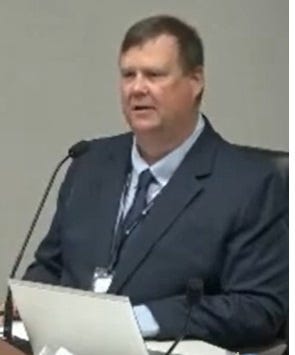On Friday July 26, 2024, Dr. Michael Brashears was appointed the Executive Director of Community Mental Health Ottawa County (CMHOC) under a five-year contract. After holding the CMHOC Executive Director Position from 2008-2013, Dr. Brashears spent time in the nonprofit sector. While recently serving as the Interim Executive Director of CMHOC, Dr. Brashears has expressed multiple concerns, including:
The State of Michigan Medicaid mental health care budget may not be large enough to handle the local demand for services.
It is unclear how the Michigan Department of Health and Human Services (MDHHS) is going to implement its state required conflict-free access and planning (CFAP) initiative. Similar concerns from other CMH organizations has the state considering changing the deadline for implementation and reimagining its approach.
The implementation of the federal and state driven certified community behavioral health clinic (CCBHC) will likely affect currently offered CMHOC services.
Just after being appointed to the Executive Director position, Dr. Brashears outlined how he plans to perform an analysis on currently operating CMH programs. He explained that it is the CMH board’s job to manage all CMH funding sources such as Medicaid, mental health millage, and grants. 88% of the CMHOC funding is from Medicaid which comes through the Lakeshore Regional Entity (LRE). Medicaid funding flows from the Federal government, to the state, to the regional entity, and then to the community mental health organization. Dr. Brashears plans to review the documents that define the relationship between CMHOC and the LRE including the 2022 operating agreement, bylaws, and the strategic plan.
During the July 26, 2024, CMHOC meeting, board member Thomas Bird asked what value the LRE provides to CMHOC. (1:48:46) “I’d like to have your candid opinion as to what value the LRE provides to us, other than simply writing checks and passing money through. We’re talking $20,000,000/year budget for the LRE.” Bird then provided background on the establishment of the LRE explaining that MDHHS felt it would be easier to manage ten regional entities as opposed to the 35 Paid Inpatient Health Plans (PIHP) contracts across the state. “At that time, our region had a $2,000,000 budget, and if you extrapolated, [] it was costing us $50,000,000/year to set up this intermediate level of administration. The way it was sold to the legislature was, we’re going to do this, and it’s going to pay for itself, because it’s going to provide services to the CMH service providers that will more than cover the costs of establishing this administrative level. Well, we’re now $20,000,000 in our LRE, and across the state there has to be hundreds of millions of dollars in money that’s siphoned out of our precious Medicaid money coming into the state. So, my question is, ‘are we getting our money’s worth from the LRE? What are they doing for us that is of value?’”
Dr. Brashears responded. (1:50:20) “So within the first ten minutes of appointing me to this position, you’re going to have me give a candid opinion about the organization that gives us all of our money? Sure, I’ll do that.”
Dr. Brashears is currently conducting an internal evaluation which includes talking to leadership groups, directors, employees, and providers, to determine processes that are enabling CMHOC to thrive and those that should be modified. Approximately one-third of the CMHOC Medicaid budget is allocated to residential care. The per/day reimbursement rate for services ranges from $70-$1400 depending on the individual and their person centered plan (PCP). CMHOC provides services to minors and adults with a variety of conditions and living arrangements, including those living in regulated adult care foster homes (AFC), those in less-formal, non-licensed AFC’s, and those living in family homes. Additionally, CMH pays for services such as community living support (CLS) workers. Dr. Brashears plans to evaluate each of these situations in different phases beginning with regulated AFCs as they make up the largest group.
In addition to providing funding for residential care, it is a requirement for CMHOC to provide youth-to-adult transitions services. Dr. Brashears plans to evaluate the current process of transition and services offered. In 2016 the community approved a 10-year mental health millage. Dr. Brashears plans to perform an outcome analysis to determine the effectiveness of millage funds. Going forward, it is possible a portion of the millage funds will be used for new and innovative CMH projects that will last for 1-2 years, and for special community projects that will improve conditions for CMH consumers.
Evaluating how and where CMH money is being spent is a significant but essential undertaking. There is a great need in Ottawa County to develop more housing for CMH consumers, as currently many live in Kent and other counties. This is only one key Ottawa County need. Thorough analysis will likely lead to significant changes that will benefit CMHOC consumers and all Ottawa County residents.
In conjunction with evaluating various services, Dr. Brashears plans to hold Board and Community Education Sessions, approximately once per week, focused on understanding CMH Funding sources and the CMHOC obligations associated with them. Dates of the sessions will be posted on the CMH website. The tentative schedule is as follows:
Medicaid Services and Funding (August 9)
State and Local General Fund (August 16)
CCBHC (August 23)
Millage (August 30)
Grants (September)


